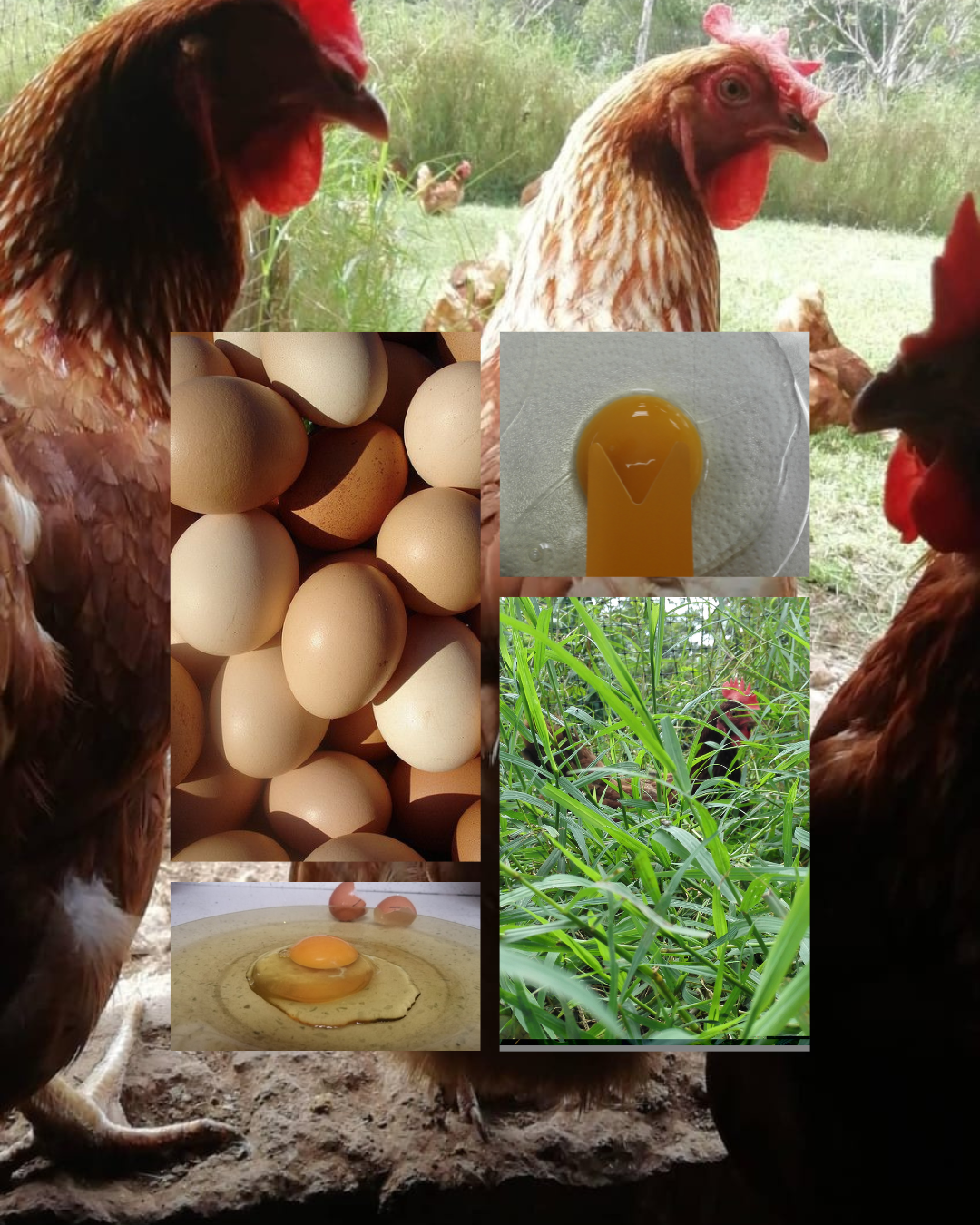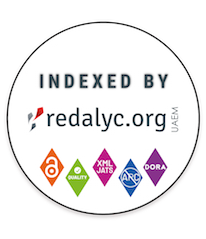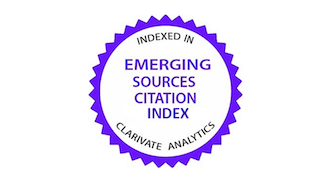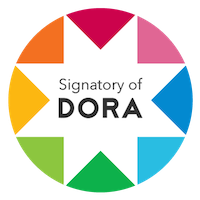Egg quality and productive performance of ISA Brown laying hens with grazing access
DOI:
https://doi.org/10.15517/am.v34i2.51511Keywords:
poultry, laying performance, egg yield, grazing, qualityAbstract
Introduction. Egg production systems are critical to food security. Concerns about animal welfare are increasing the interest in egg production systems with access to grazing. Objective. To describe the productive performances, morphological characteristics, and nutritional quality of the eggs from laying hens of the Isa Brown genetic line in a floor system with access to grazing. Materials and Methods. The research was carried out between July 2018 and January 2020 in the central canton of Turrialba, Cartago, Costa Rica, with hens of the Isa Brown genetic line with access to grazing. Productive performances were compared with the standard of the genetic line. External and internal morphological variables of the egg were evaluated and its nutritional content (dry matter, crude protein, ethereal extract, ash, calcium, phosphorus, saturated fatty acids (SFA), monounsaturated (MUFA), and polyunsaturated (PUFA) was characterized in hens of different ages. Results. The productive performances was not different from the genetic standard. The increase in bird age had a statistically significant influence on the increase in egg and shell weight, and the decrease in morphological index. Nutritional analysis indicated that increasing hen age decreased the dry matter content and the concentration of SFA and MUFA in the egg. The PUFA/SFA ratio of the eggs was higher than 0.45, regardless of the age of the laying hen. Conclusion. The productive indicators of the hens with access to grazing did not differ from ISA Brown genetic line standards for alternative systems. Egg weight, yolk index, Haugh units, and morphology index varied with the age of the hen.
Downloads
References
Al-Batshan, H. A., Scheideler, S. E., Black., B. L., Garlich, J. D., & Anderson, K. E. (1994). Duodenal calcium uptake, femur ashm and eggshell quality decline with the age and increase following molt. Poultry Science, 73(10), 1590–1596. https://doi.org/10.3382/ps.0731590
Artan, S., & Durmuş, I. (2015). Köy, serbest ve kafes sistemlerinde üretilen yumurtaların kalite özellikleri bakımından karşılaştırılması. Akademik Ziraat Dergisi, 4(2), 89–97. https://dergipark.org.tr/tr/pub/azd/issue/32194/358147
Association of Official Analytical Chemist. (1997). Official methods of analysis of AOAC International (16th ed., 3rd rev.). AOAC International.
Batkowska, J., & Brodacki, A. (2017). Selected quality traits of eggs and the productivity of newlycreated laying hens dedicated to extensive system of rearing. Archives Animal Breeding, 60(2), 87–93. https://doi.org/10.5194/aab-60-87-2017
Benavides-Reyes, C., Folegatti, E., Dominguez-Gasca, N., Litta, G., Sanchez-Rodriguez, E., Rodriguez-Navarro, A. B., & Umar Furuk, M. (2021). Research Note: Changes in eggshell quality and microstructure related to hen age during a production cycle. Poultry Science, 100(9), Article 101287. https://doi.org/10.1016/j.psj.2021.101287
Bray, H. J., & Ankeny, R. A. (2017). Happy chickens lay tastier eggs: Motivations for buying free-range eggs in Australia. Anthrozoos, 30(2), 213–226. https://doi.org/10.1080/08927936.2017.1310986
Cao, Y., & Li, D. (2013). Impact of increased demand for animal protein products in Asian countries: Implications on global food security. Animal Frontiers, 3(3), 48–55. https://doi.org/10.2527/af.2013-0024
Campbell, D. L. M., Bari, M. S., & Rault, J. -L. (2021). Free-range egg production: its implications for hen welfare. Animal Production Science, 61(9–10), 848–855. https://doi.org/10.1071/AN19576
Campbell, D. L. M., Lee, C., Hinch, G. N., & Roberts, J. R. (2017). Egg production and egg quality in free-range laying hens housed at different outdoor stocking densities. Poultry Science, 96(9), 3128–3137. https:/doi.org/10.3382/ps/pex107
Chavarría-Zamora, S., Chacón-Villalobos, A., & WingChing-Jones, R. (2021). Efecto del alojamiento de las gallinas (pastoreo, piso, jaula) sobre ácidos grasos, consumo y percepción sensorial de sus huevos. Cuadernos de Investigación UNED, 13(1), Artículo e3317. https://doi.org/10.22458/urj.v13i1.3317
Curtis, P. A., Kerth, L. K., & Anderson, K. E. (2005, May 23-26). Quality and compositional characteristics of layer hens as affected by bird age [Presentation]. XI European Symposium on the Quality of Eggs and Egg Products, Doorwerth, The Netherlands.
Ferrante, V., Lolli, S., Vezzoli, G., & Guidobono Cavalchini, L. (2009). Effects of two different rearing systems (organic and barn) on production performance, animal welfare traits and egg quality characteristics in laying hens. Italian Journal of Animal Science, 8(2), 165–174. https://doi.org/10.4081/ijas.2009.165
Freitas, L. C. S. R., Tinôco, I. F. F., Baêta, F. C., Barbari, M., Conti, L., Teles Júnior, C. G. S, Cândido, M. G. L., Morais, C. V., & Sousa, F. C. (2017). Correlation between egg quality parameters, housing thermal conditions and age of laying hens. Agronomy Research, 15(3), 687–693. https://bit.ly/3NuHdZL
Galic, A., Filipovic, D., Janjecic, Z., Bedekovic, D., Kovacev, I., Copec, K., & Pilestic, S. (2019). Physical and mechanical characteristics of Hisex Brown hen eggs from three different housing systems. South African Journal of Animal Science, 49(3), 468–476. http://doi.org/10.4314/sajas.v49i3.7
Guo, J., Kliem, K. E., Lovegrove, J. A., & Givens, D. I. (2017). Effect of production system, supermarket and purchase date on the vitamin D content of eggs at retail. Food Chemistry, 221, 1021–1025. https://doi.org/10.1016/j.foodchem.2016.11.060
Henchion, M., Hayes, M., Mullen, A. M., Fenelon, M., & Tiwari, B. (2017). Future protein supply and demand: Strategies and factors influencing a sustainable equilibrium. Foods, 6(7), Article 53. https://doi.org/10.3390/foods6070053
Holt, P. S., Davies, R. H., Dewulf, J., Gast, R. K., Huwe, J. K., Jones, D. R., Waltman, D., & Willian, K. R. (2011). The impact of different housing systems on egg safety and quality. Poultry Science, 90(1), 251–262. https://doi.org/10.3382/ps.2010-00794
Human Farm Animal Care. (2018). Normas HFAC para gallinas ponedoras de huevo. https://bit.ly/3Wz7kmm
Ianni, A., Bartolini, D., Bennato, F., & Martino, G. (2021). Egg quality from Nera Atriana, a local poultry breed of the Abruzzo Region (Italy), and ISA Brown hens reared under Free Range conditions. Animals, 11(2), Article 257. https://doi.org/10.3390/ani11020257
Instituto Meteorológico Nacional. (2021). Boletín meteorológico mensual: enero 2019 - diciembre 2019. Retrieved from https://www.imn.ac.cr/boletin-meteorologico
ISA poultry. (s.f.). ISA-Brown en sistemas alternativos. Recuperado diciembre, 2021 de https://bit.ly/2xw1qwg
Karsten, H. D., Patterson, P. H., Stout, R., & Crews, G. (2010). Vitamins A, E and fatty acid composition of the eggs of caged hens and pastured hens. Renewable Agriculture and Food Systems, 25(1), 45–54. https://doi.org/10.1017/S1742170509990214
Kocevski, D., Nikolova, N., & Kuzelov, A. (2011). The influence of strain and age on some egg quality parameters of commercial laying hens. Biotechnology in Animal Husbandry, 27(4), 1649–1658. https://doi.org/10.2298/BAH1104649K
Krawczyk, J., & Gornowicz, E. (2010). Quality of eggs from hens kept in two different free-range systems in comparison with a barn system. Archiv für Geflügelk, 74(3), 151–157. https://bit.ly/3XAkPni
Küçükyilmaz, K., Bozkurt, M., Nur Herken, E., Çınar, M., Uğur Çatlı, A., Bintaş, E., & Çöven, F. (2012). Effects of rearing systems on performance, egg characteristics and immune response in two layer hen genotype. Asian-Australasian Journal of Animal Sciences, 25(4), 559–568. https://doi.org/10.5713/ajas.2011.11382
Leenstra, F., Ten Napel, J., Visscher, J., & Van Sambeek, F. (2016). Layer breeding programmes in changing production environments: a historic perspective. World´s Poultry Science Journal, 72(1), 21–26. https://doi.org/10.1017/s0043933915002743
Lukanov, H., Genchev, A., & Pavlov, A. (2015). Egg quality and shell colour characteristics of crosses between Araucana and Schijndelaar with highly productive White Leghorn and Rhode Island Red strains. Agricultural Science and Technology, 7(3), 366–371. https://bit.ly/3j5VBy1
MacKenney Kirste, L. P., & Monzón Díaz, O. R. (2014). Evaluación de las líneas de gallinas ponedoras Hy-Line CV-22® Y Dekalb White® en un sistema de semipastoreo en Zamorano, Honduras [Tesis licenciatura, Escuela Agrícola Panamericana]. Repositorio de la Escuela Agrícola Panamericana. https://bdigital.zamorano.edu/bitstream/11036/3486/1/CPA-2014-051.pdf
Meijerhof, R. (1994). Theoretical and empirical studies on temperature and moisture loss of hatching eggs during the pre-incubation period [Doctoral thesis, Wageningen University]. Wageningen University & Research Library. https://library.wur.nl/WebQuery/wurpubs/27322
Meseret, S. (2016). A review of poultry welfare in conventional production system. Livestock Research of Rural Development, 28, Article 234. http://www.lrrd.org/lrrd28/12/mese28234.html
Miao, Z. H., Glatz, P. C., & Ru, J. Y. (2005). Free-range Poultry Production – A Review. Asian Australian Journal of Animal Science, 18(1), 113–132. https://doi.org/10.5713/ajas.2005.113
Misir, R., Laarveld, B., & Blair, R. (1985). Evaluation of a rapid method for preparation of fatty acid methyl esters for analysis by gas-liquid chromatography. Journal of Chromatography A, 331, 141–148. https://doi.org/10.1016/0021-9673(85)80015-7
Mørch Andersen, L. M. (2011). Animal welfare and eggs-Cheap talk or money on the counter? Journal of Agricultural Economics, 63(3), 565–584. https://doi.org/10.1111/j.1477-9552.2011.00310.x
Nasri, H., van den Brand, H., Najjar, T., & Bouzouaia, M. (2019). Egg storage and breeder age impact in egg quality and embryo development. Journal of Animal Physiology and Animal Nutrition, 104(1), 257–268. https://doi.org/10.1111/jpn.13240
Norwood, F. B., & Lusk, J. L. (2011). A calibrated auction-conjoint valuation method: Valuing pork and eggs produced under differing animal welfare conditions. Journal of Environmental Economics and Management, 62(1), 80–94. https://doi.org/10.1016/j.jeem.2011.04.001
Nowaczewski, S., Kontecka, H., Rosinski, A., Koberling, S., & Koronowski, P. (2010). Egg quality of Japanese quail depends on layer age and storage time. Folia Biologica (Kraków), 58(3–4), 201–207. http://www.isez.pan.krakow.pl/journals/folia/pdf/58(3-4)/58(3-4)_11.pdf
Nys, Y. (2017). Laying hen nutrition: optimizing hen performance and health, bone and eggshell quality. In Y. Nys (Ed.), Achieving sustainable production of eggs (1st ed., pp. 29–56). Institut National de la Recherche Agronomique.
Ochs, D., Wolf, C. A., Widmar, N. O., Bir, C., & Lai, J. (2019). Hen housing system information effects on U.S. egg demand. Food Policy, 87, Article 101743. https://doi.org/10.1016/j.foodpol.2019.101743
Okedere, D. A., Ademola, P., & Asiwaju, P. M. (2020). Performance and cost-benefit analysis of Isa Brown layers on different management systems. Bulletin of the National Research Centre, 44, Article 74. https://doi.org/10.1186/s42269-020-00332-w
Pavlovski, Z., Škrbić, Z., & Lukić, M. (2011). Free systems of rearing of chickens and layer hens: quality of meat and eggs. Tehnologija Mesa, 52(1), 160–166. https://bit.ly/3wCycbo
Pérez-Bonilla, A., Novoa, S., García, J., Mohiti-Asli, M., Frikha, M., & Mateos, G. G. (2012). Effects of energy concentration of the diet on productive performance and egg quality of brown egg-laying hens differing in initial body weight. Poultry Science, 91(12), 3156–3166. http://doi.org/ 10.3382/ps.2012-02526
Pintea, A., Dulf, F., Bunea, A., Matea, C., & Andrei, S. (2012). Comparative analysis of lipophillic compounds in eggs organically raised ISA Brown and Araucana hens. Chemical papers, 66(10), 955–963. https://doi.org/10.2478/s11696-012-0219-2
Rayan, G. N., Galal, A., Fathi, M. M., & El-Attar, A. H. (2010). Impact of layer breeder flock age and strain on mechanical and ultrastructural properties of eggshell in chicken. International Journal of Poultry Science, 9(2), 139–147. https://doi.org/10.3923/ijps.2010.139.147
Réhault-Godbert, S., Guyot, N., & Nys, Y. (2019). The golden egg: nutritional value, bioactivities and emerging benefits for human health. Nutrients, 11(3), Article 684. https://doi.org/10.3390/nu11030684
Rodríguez Mengod, A. (2016). Tipificación de la calidad del huevo de gallina ecológico y convencional [Tesis doctoral, Universidad Politécnica de Valencia]. Repositorio Institucional de la Universidad Politécnica de Valencia. https://doi.org/10.4995/Thesis/10251/71437
Ruhnke, I., Cowling, G., Sommerlad, M., Swick, R., & Choct, M. (2014, September 11-13). Gut impaction in free range hens [Presentation]. Congress of the European Society of Veterinary and Comparative Nutrition, Utrecht, The Netherlands.
Samiullah, S., & Roberts, J. R. (2014). The eggshell cuticle of the laying hen. Worlds Poultry Science Journal, 70(4), 693–708. https://doi.org/10.1017/S0043933914000786
Samiullah, S., Roberts, J. R., & Chousalkar, K. (2014). Effect of production system and flock age on egg quality and total bacterial load in commercial laying hens. The Journal of Applied Poultry Research, 23(1), 59–70. https://doi.org/10.3382/japr.2013-00805
Samiullah, S., Roberts, J. R., & Chousalkar, K. (2016). Oviposition time, flock age, and egg position in clutch in relation to brown eggshell color in laying hens. Poultry Science, 95(9), 2052–2057. https://doi.org/10.3382/ps/pew197
SAS Institute (2012). SAS/STAT® 9.1. user´s guide. SAS Institute Inc.
Scholtyssek, S. (Ed.) (1970). Manual de avicultura moderna. Editorial Acribia. https://www.editorialacribia.com/libro/manual-de-avicultura-moderna_53966/
Sharma, M. K., McDaniel, C. D., Kiess, A. S., Loar, R. E., & Adhikari, P. (2022). Effect of housing environment and hen strain on egg production and egg quality as well as cloacal and eggshell microbiology in laying hens. Poultry Science, 101(2), Article 101595. https://doi.org/10.1016/j.psj.2021.101595
Shields, S., Shapiro, P., & Rowan, A. (2017). A decade of progress toward ending the intensive confinement of farm animals in the United States. Animals, 7(12), Article 40. https://doi.org/10.3390/ani7050040
Silversides, F. G. (1994). The haugh unit correction for egg weight is not adequate for comparing eggs from chickens of different lines and ages. Poultry Science, 3(2), 120–126. https://doi.org/10.1093/japr/3.2.120
Simopoulos, A. P. (2000). Symposium: role of poultry products in enriching the human diet with n-3 PUFA. Poultry Science, 79(7), 961–970. https://doi.org/10.1093/ps/79.7.961
Singh, M., Ruhnke, I., de Koning, C., Drake, K., Skerman, A. G., Hinch, G. N., & Glatz, P. C. (2017). Demographics and practices of semi-intensive free-range farming systems in Australia with an outdoor stocking density of <1500 hens/hectare. PLOS ONE, 12(10), Article e0187057. https://doi.org/10.1371/journal.pone.0187057
Škrbić, Z., Lukić, M., Petričević, V., Bogosavljević-Bošković, S., Rakonjac, S., Dosković, V., & Tolimir, N. (2020). Quality of eggs from pasture rearing layers of different genotypes. Biotechnology in Animal Husbandry, 27(3), 659–667. https://doi.org/10.2298/BAH2002181S
Škrbić, Z., Pavlovski, Z., Lukić, M., Vitorović, D., Petričević, V., & Stojanović, L. J. (2011). Changes of egg quality properties with the age of layer hens in traditional and conventional production. Biotechnology in Animal Husbandry, 27(3), 659–667. https://doi.org/10.2298/BAH1103659S
Sokołowicz, Z., Dykiel, M., Krawczyk, J., & Augustyńska-Prejsnar, A. (2019). Effect of layer genotype on physical characteristics and nutritive value of organic eggs. CyTA- Journal of Food, 17(1), 11–19. https://doi.org/10.1080/19476337.2018.1541480
Su, Y., Ge, Y., Xu, Z., Zhang, D., & Li, D. (2021). The digestive and reproductive tract microbiotas and their association with body weight in laying hens. Poultry Science, 100(11), Article 101422. https://doi.org/10.1016/j.psj.2021.101422
Tona, K., Onagbesan, O., De Ketelaere, B., Decuypere, E., & Bruggeman, V. (2004). Effects of age of broiler breeders and egg storage on egg quality, hatchability, chick quality, chick weight, and chick post hatch growth to forty-two days. The Journal of Applied Poultry Research, 13(1), 10–18. https://doi.org/10.1093/japr/13.1.10
Travel, A., Nys, Y., & Lopes, E. (2010). Facteurs physiologiques et environnementaux influençant la production et la qualité de l´oeuf. INRAE Productions Animales, 23(2), 155–166. https://doi.org/10.20870/productions-animales.2010.23.2.3297
Ulmer-Franco, A. M., Fasenko, G. M., & O’Dea Christopher, E. E. (2010). Hatching egg characteristics, chick quality, and broiler performance at 2 breeder flock ages and from 3 egg weights. Poultry Science, 89(12), 2735–2742. https://doi.org/10.3382/ps.2009-00403
United States Department of Agriculture. (2019, January 4). FoodData Central Search Results. Egg, whole, raw, frozen, pasteurized. https://fdc.nal.usda.gov/fdc-app.html#/food-details/323604/nutrients
Van Den Brand, H., Parmentier, H., & Kemp, B. (2010). Effects of housing system (outdoor vs cages) and age of laying hens on egg characteristics. British Poultry Science, 45(6), 745–752. https://doi.org/10.1080/00071660400014283
Yenice, G., Kaynar, O., Ileriturk, M., Hira, F., & Hayirli, A. (2016). Quality of eggs in different production systems. Czech Journal of Food Science, 31(4), 370–376. https://doi.org/10.17221/33/2016-CJFS
Yilmaz Dikmen, B., Ípek, A., Şahan, Ü., Petek, M., & Sözcü, A. (2016). Egg production and welfare of laying hens kept in different housing systems (conventional, enriched cage, and free range). Poultry Science, 95(7), 1564–1572. https://doi.org/10.3382/ps/pew082
Zakaria, A. H., Miyaki, T., & Imai, K. (1983). The effect of aging on ovarian follicle growth in laying hens. Poultry Science, 62(4), 670–674. https://doi.org/10.3382/ps.0620670

Downloads
Additional Files
Published
How to Cite
Issue
Section
License
Copyright (c) 2023 Rodolfo WingChing-Jones, Rebeca Zamora-Sanabria, Sianny Chavarría-Zamora

This work is licensed under a Creative Commons Attribution-NonCommercial-NoDerivatives 4.0 International License.
1. Proposed policy for open access journals
Authors who publish in this journal accept the following conditions:
a. Authors retain the copyright and assign to the journal the right to the first publication, with the work registered under the attribution, non-commercial and no-derivative license from Creative Commons, which allows third parties to use what has been published as long as they mention the authorship of the work and upon first publication in this journal, the work may not be used for commercial purposes and the publications may not be used to remix, transform or create another work.
b. Authors may enter into additional independent contractual arrangements for the non-exclusive distribution of the version of the article published in this journal (e.g., including it in an institutional repository or publishing it in a book) provided that they clearly indicate that the work was first published in this journal.
c. Authors are permitted and encouraged to publish their work on the Internet (e.g. on institutional or personal pages) before and during the review and publication process, as it may lead to productive exchanges and faster and wider dissemination of published work (see The Effect of Open Access).



























